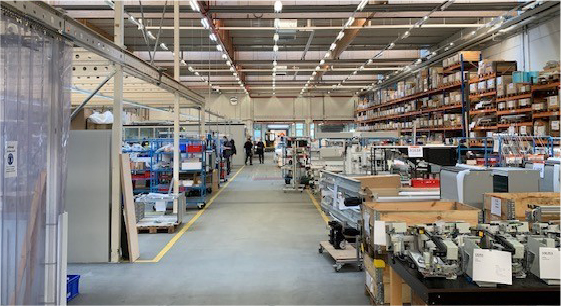Das Unternehmen
Wir – die KNAPP Smart Solutions GmbH mit Sitz in Gelsenkirchen entwickeln und produzieren automatische Lagersysteme, Mess- und Wiegetechnik sowie Softwarelösungen für die Apotheke, Industrie, Logistik und den Einzelhandel. Mit den unternehmenseigenen Marken ApoStore, RetailStore und InduStore liefern wir vollumfängliche Automatisierungslösungen.
Unsere modernen Technologien optimieren branchenübergreifend innerbetriebliche Prozesse durch die Vernetzung von automatisierten Warenlagern, E-Commerce und dem stationären Handel. Unsere Geschichte als Technologiepioniers in Gelsenkirchen begann 1986 mit der Konstruktion des weltweit ersten Kommissionier-Roboters. Seit 2000 planen, bauen und installieren wir automatisierte Lagersysteme und Logistikkonzepte in ganz Europa. Heute arbeiten mehr als 140 Mitarbeiterinnen und Mitarbeiter für KNAPP Smart Solutions.
Wir nutzen unsere über 35 jährige Erfahrung aus dem Bereich der Automatisierungslösungen für Apotheken, Krankenhäuser und pharmazeutischem Großhandel um auch anderen Branchen wertvolle Lösungen anzubieten. Die Impulse aus dem stationären Einzelhandel und der Industrie übersetzen wir wieder zurück in den Gesundheitsbereich.
Unsere Produktion ist „Made in Germany“.
KNAPP Smart Solutions GmbH
Uferstraße 10
45881 Gelsenkirchen
Deutschland
Tel: +49 209 94117 0
USt.IdNr DE 300 827 208 / HRB 17444
Healthcare
Die Marke ApoStore bietet Automatisierungs-
technologie für den Gesundheitssektor wie Apotheken, Krankenhäuser und den Pharmagroßhandel. Die individuelle Erreichbarkeit und Verfügbarkeit von medizinischen Produkten sind zentrale Punkte.
Retail
Der RetailStore, die Lösung für Lagerlogistik mit Point-of-Sale Vernetzung, bildet den Schwerpunkt für automatisierte und digitale Prozesse im Handel und ermöglicht eine nahtlose Integration von nachhaltigen Einkaufserlebnissen für den Endkunden.
Industry
Mit dem InduStore bieten wir eine flexible Lagerlösung, die auf die Anforderungen der verschiedenen Industrieumgebungen angepasst werden kann. Unser Messtechnik- Portfolio umfasst Messe- und Wiegetechnik sowie industrielle Services.
Geschichte
Management
Durch die Kombination von Automatisierungstechnik und digitalen POS-Lösungen bieten wir potenziellen Kunden aus Industrie und Einzelhandel einen smarten Weg Richtung "Last Mile 2.0".
Durch die Vielfalt unserer Automatenfamilie und unserer digitalen Produkte haben wir immer die passende Lösung, die auf die Anforderungen der jeweiligen Kunden zugeschnitten ist.
KNAPP Smart Solutions als Arbeitgeber
Was erwartet dich als Mitarbeiter bei uns?
Unsere Unternehmenswerte wie Zuverlässigkeit, Aufrichtigkeit und Lösungsorientierung bilden die Basis für unsere positive und familienfreundliche Unternehmenskultur.
KNAPP Smart Solutions eröffnet spannende Karriereperspektiven und bietet vielseitige und attraktive Möglichkeiten für all jene, die eine Herausforderung in einem dynamisch wachsenden Unternehmen suchen. Der Firmensitz von KNAPP Smart Solutions liegt in Gelsenkirchen, im Kult-Stadtteil Schalke. Die Innenstadt der Ruhrmetropole Essen erreicht man in 15 Minuten mit dem Auto. Als Tochter der österreichischen KNAPP AG sind wir global vernetzt. Sie begeistern sich für unser Unternehmen und unsere Produkte und arbeiten gerne in innovativen Teams?
Erfahren Sie hier mehr über Ihre persönlichen Möglichkeiten bei der KNAPP Smart Solutions GmbH. Engagierte und qualifizierte neue Kollegen suchen wir für unsere Vorhaben immer wieder. Auch Studierende finden bei uns vielfältige Angebote und Werkstudententätigkeiten.






